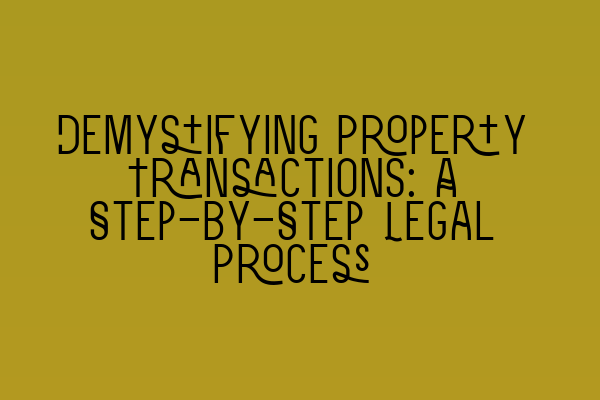Demystifying Property Transactions: A Step-by-Step Legal Process
When it comes to buying or selling a property, the legal process involved can often seem overwhelming and confusing. From contracts and searches to negotiations and completion, there are numerous steps that need to be followed to ensure a smooth and successful transaction. In this blog post, we aim to demystify the property transaction process by providing a step-by-step guide to understanding the legal aspects involved.
1. Instruction and Retainer
The first step in any property transaction is for the buyer or seller to instruct a solicitor. This involves formally engaging the services of a legal professional who will act on your behalf throughout the process. At SQE Property Law & Land Law, we have a team of experienced solicitors ready to assist you with all your property law needs.
Once you have instructed a solicitor, they will provide you with a client care letter and terms of engagement. These documents outline the scope of work, fees, and any other relevant information you need to know. It is essential to carefully review and sign these documents to proceed further.
2. Preliminary Checks
Next, your solicitor will conduct initial checks to ensure there are no legal barriers or issues that may affect the transaction. This includes verifying the title of the property, checking for any outstanding mortgages, liens, or charges, and investigating any potential planning restrictions or disputes.
Additionally, your solicitor will request the necessary identification documents from you as part of anti-money laundering regulations. It is important to provide these promptly and accurately to avoid any delays in the process.
3. Contract Negotiation
Once the preliminary checks are complete, your solicitor will begin the contract negotiation process. This involves reviewing the draft contract provided by the seller’s solicitor, making necessary amendments or additions, and ensuring that all terms and conditions are fair and favorable to you as the buyer.
During this stage, your solicitor will also advise you on any additional surveys or inspections that may be required, such as building surveys or environmental reports, to assess the condition and potential risks associated with the property.
4. Searches and Enquiries
Conducting thorough searches and enquiries is a crucial step in the property transaction process. Your solicitor will carry out various searches with relevant authorities, such as local councils and environmental agencies, to gather information about the property and its surroundings.
These searches may include local authority searches, drainage and water searches, environmental searches, and chancel repair liability searches. The purpose of these searches is to identify any potential issues or restrictions that may impact the property or its value.
5. Mortgage and Finance
If you require a mortgage or any other form of finance to proceed with the property purchase, your solicitor will liaise with the lender and handle all necessary legal documentation. This includes reviewing the mortgage offer, advising on the terms and conditions, and ensuring compliance with any specific requirements set by the lender.
It is important to keep in mind that the mortgage and finance process can sometimes be time-consuming, so it is advisable to start this process as early as possible to avoid any last-minute complications.
6. Exchange of Contracts
Once all negotiations, searches, and enquiries have been completed, and all parties are satisfied with the terms of the transaction, the next step is the exchange of contracts. This is a legally binding stage where both buyer and seller commit to completing the transaction on a specified date.
Your solicitor will ensure that all necessary documentation, including the contract, deposit, and any additional requirements, are in place before proceeding with the exchange. It is important to note that after the exchange of contracts, both parties are legally bound to complete the transaction, and failure to do so may result in financial penalties or legal action.
7. Completion and Post-Completion
The final stage of the property transaction process is the completion, where the balance of the purchase price is paid, and legal ownership is transferred from the seller to the buyer. Your solicitor will coordinate with all parties involved, including mortgage lenders and other solicitors, to ensure a smooth and timely completion.
Following completion, your solicitor will handle the payment of Stamp Duty Land Tax (SDLT) if applicable, and register the property in your name with the Land Registry. They will also provide you with all the necessary documentation, including the title deeds and a completion statement.
Conclusion
By following this step-by-step guide, you can gain a better understanding of the legal aspects involved in property transactions. It is important to engage the services of a reputable solicitor, like SQE Property Law & Land Law, to ensure a smooth and successful transaction.
If you have any questions or need assistance with your property transaction, please feel free to contact us. Our team of solicitors is here to help you at every stage of the process.
Related Articles:
